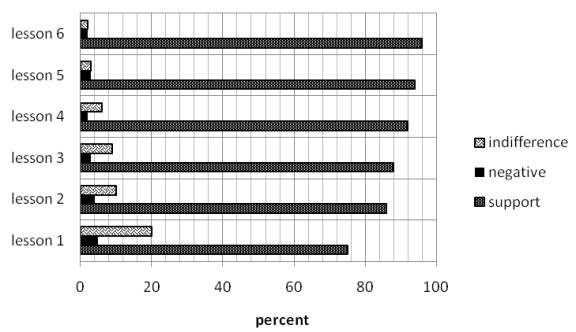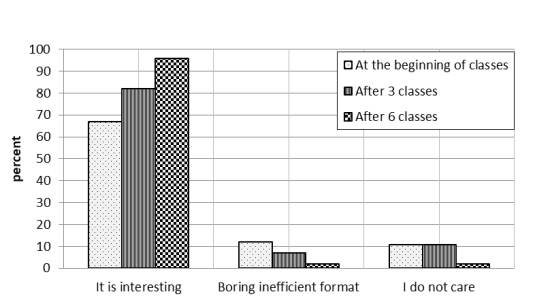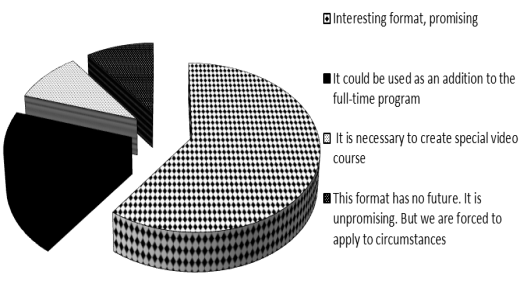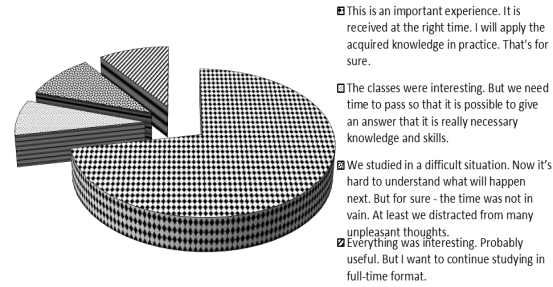Abstract
The relevance of the article is due to the challenges of the world pandemic time has proved the need to expand and improve educational opportunities at all levels of education. The purpose of the article is to identify and justify the communication strategies of distance learning as recreational resources that contribute to the improvement of pedagogical activity and optimize the distance learning process. The article presents the results of the reflection of the social effect of training courses for teachers of social institutions conducted as part of the Charitable Foundation “Way of life” project (Moscow, Russia) with the advisory and expert support of researchers from the Institute of Pedagogy, Psychology and Social Problems (Kazan, Russia). Opportunities, gaps and problems of training for the systematic replenishment of relevant scientific and theoretical knowledge and skills in various fields of pedagogical activity in the distant mode are evaluated. The content of the communicative strategies proposed by the authors that facilitate the adaptation of students to digital reality without essential losses in the social significance of learning is disclosed. Authors describe how to overcome various risks using authors’ communication strategies - including the risk of losing emotional contact with the audience. The proposed communication strategies of distance learning can be implemented both for the education of children and adults, as well as in the framework of inclusive online education.
Keywords: Communication strategiesdigitalization eradistance learninginteractive forms of workrecreational resourcesocial effect
Introduction
Digitalization, having begun to be introduced globally into our lives through the global banking sector, has seriously changed the paradigm of business, creating a real digital format with high speed of interaction and open information; these technologies have now become more or less part of our daily lives (Dudija, 2019; Morakanyane et al., 2017). Social and humanitarian studies in the field of education digitalization until 2020 analyzed the positions of problems and threats, prospects and potential, challenges and risks, that is, they were of a discussion nature: from technological pessimism and a possible uprising of machines (Allwood, 2017) to technological optimism as new opportunities and convenient transformation of digital technologies (Levina, 2019). A separate block in the field of unresolved issues of education digitalization remained: problems of convergence of digital natives and digital migrants (students and teachers) (Barak, 2018); development of educational environments and platforms; didactics of the digital world (Andryukhina et al., 2020; Tomyuk et al., 2019). And the most important humanitarian issues of education - how not to lose a Person in a digital environment, how can teacher to transfer not only knowledge, but also sociocultural values to students, how to provide social and pedagogical support to children and adults in a digital environment (Beregovaya et al., 2017; Legkobytova et al., 2019)?
While we were looking for answers, the global pandemic COVID 19 has transformed our familiar world, becoming an acute challenge for all areas of modern education (Arora & Srinivasan, 2020; Darr & Hipkins, 2020). The suddenly changed reality put forward the demand for a quick response, not just in the search for fundamentally new approaches and solutions but in changes in the vector of the education content, training formats and the introduction of educational technologies that can motivate:
1) students - for self-discipline, readiness for included participation in online classes, self-regulation and self-control;
2) teachers - to a flexible and adequate response to students' requests, the use of a complex of blocks and training modules, which are built on a combination of various intellectual operations;
3) all participants of the educational process - to tolerant and active communication, taking into account the specifics of the distant format: a) the balance of digital literacy of students and teachers; b) imperfection of didactic means; c) narrowing of the pedagogical influence methods on students; d) digital inequality (from the lack of technical means to the quality of educational processes access and distortion).
To search and justify the mechanisms for optimizing online learning, the study presents the authors’ reflection results of the social effect of social institutions teachers’ training conducted during the pandemic (March - June 2020). The authors implemented an online training course for social educators “Psychological vaccination”. The modular program of training courses is designed taking into account the emergence of a risks’ whole range and the complication of the situation in closed institutions for orphans.
Given the recommendations of government agencies to work during a pandemic period overcoming professional burnout, panic and depressive states, pessimism) additional modules as a recreational resource were added to the program in order to support specialists in isolation.
Problem Statement
The external social situation of the pandemic complicated the already very specific work of social educators in institutions for children with various developmental disabilities. Their quality work involves not only the development of knowledge and skills in the field of developing care, physical rehabilitation, overcoming attachment disorders, but also the skills of using a variety of didactic forms and technologies (game training, art therapy, psychotherapy (Opic, 2017; Prince, 2020; Stukalova, 2019), as well as techniques to overcome the effects of their own professional burnout (Karłyk-Ćwik, 2018; Tschiesner & Farnet, 2017). To this end, seminars and trainings are organized that are aimed at continuing education of social educators. Of course, most of these activities are based on body-oriented practices and involves a full-time format.
The difficult epidemiological situation required to switch to the distance education format, as unauthorized persons’ access to social institutions is strictly limited. Meanwhile, the support of employees of social institutions is especially important because during the period of isolation, emotional and physical stresses on employees and wards of such institutions significantly increase.
Thus, the program “Psychological vaccination” was created by the authors with the aim of psychological support for teachers during the training period and to reduce the risks of their professional activities. On this basis, online classes were developed and organized on psychological support, methods of dealing with stress and anxiety (1 module); methods for organizing classes with children in the absence of habitual activity (module 2).
A feature of its implementation in the online format is the search and justification of universal digital communication strategies.
Research Questions
1) Does the distant learning format reduce the level of emotional perception of the content of classes?
2) How do social institution employees and teachers assess the potential of distance education, and, in particular, in comparison with full-time education?
3) Is the use of knowledge and skills acquired in online classes promising in the professional activities of teachers working with “special children” in closed institutions?
Purpose of the Study
Purpose of the Study: identify and justify universal communication strategies of distance learning as recreational resources that contribute to the improvement of pedagogical activity and optimize the process of distance learning.
Research Methods
1) Surveys of employees undergoing training under the modular program “Psychological vaccination” (implemented during the period: March - June 2020) - 64 employees participated in the surveys - educators of social institutions;
2) A detailed survey of the heads of 6 social institutions from different regions of Russia, Deputy Minister of Labor and Social Development of North Ossetia-Alania A.K. Mamaeva, Deputy Minister of Labor and Social Protection of the Kaluga Region E.Yu. Alekseeva;
3) Reports of 6 teachers who conducted classes as part of a modular program, and 4 employees of the Charity Foundation “Way of Life”;
4) Preparation of expert opinions, including a) an assessment of the quantitative results of the program, the emerging risks and the possibilities to overcome them; b) analysis of new, unplanned results of the program and resources for their further broadcasting; c) study of feedback from trained employees; class reports;
5) Mathematical and statistical methods for processing research results.
Findings
The authors identified the following communication strategies for distance learning, which made it possible to optimize digital educational interaction in a pandemic and bring it closer to the full-time format (Table
Based on the results of the implementation of the presented communication strategies in the distance education of social institutions’ teachers in a pandemic, the authors conducted a series of surveys and analytical studies as part of a modular program “Psychological vaccination”. We present their generalized results.
Assessment of the emotional involvement of social institutions’ teachers (Figure

The Figure
2) Attitude to the possibilities of distance education (Figure

The Figure
Self-assessment of the training of social institutions’ teachers by the organizers of the course. (Figure

Despite the difficulties, the organizational and pedagogical experience allowed to productively implement the program “Psychological vaccination” for teachers of social institutions during the pandemic. Many organizers would consider it ideal to combine full-time and distant learning after a pandemic.
Assessment of the experience of distance learning in a pandemic by all participants of the process (Figure

Most participants in the process praised the knowledge and skills gained as a result of the course, noted the importance and importance of systematic work during the pandemic as support for the professional community, community of process interactions.
In the course of the research, 2 expert opinions were compiled - the experts were the Doctor of Education E.Yu. Levina, PhD (psychological sciences) V.P. Chemekov. Experts emphasized that:
- participants, who have completed the training program, received recommendations and feedback based on the results of a study of their emotional state, factors affecting their physical and emotional state, in the process of individual conversations and consultations (communicative strategy of "focusing on the individual");
- according to the feedback of the seminar participants, the skills and knowledge acquired by them in the framework of the “Psychological Vaccination” program during the isolation period allowed them to easily overcome an emotionally difficult period, relying on internal resources.
In the future, this received effect can be used due to the constant inclusion of distance learning and consultation in the training program for teachers of social institutions.
Conclusion
In the course of the research, the authors summarized and introduced the pedagogical practice of the following communication strategies to optimize the distance education of social institutions’ teachers in a pandemic: "focus on the individual"; "distant format feasibility"; “creating a professional community of like-minded people”; “the complexity of training modes”; “motivation for self-education”; "amplification". Due to the fact that the training of social institutions’ teachers is a critically complex process (inclusion, work with orphans, a closed institution, social isolation, a regime of complete isolation in a pandemic and others), and in these conditions, the applied distance learning communication strategies turned out to be productive, we can recommend them as universal (basic) when teaching all age groups.
The study of communicative strategies of distance education allows to state with a sufficient degree of certainty that:
1) the distant learning format does not reduce the level of emotional perception of the classes’ content;
2) classes in an online format positively affect the growth of cognitive interests of students in the problems of education, if the selection of topics is carried out taking into account the relevant areas of learning;
3) educators and training organizers highly appreciate the potential of distance education;
4) the application of knowledge and skills acquired in online classes in the professional activities of teachers is quite promising;
5) the developed communication strategies of distance education are fully recreational digitalization resources with high humanistic significance.
Acknowledgments
This article was completed as part of the project “An Integrated Model for the Prevention of Professional Burnout of Social Workers in Moscow” (application No. 2019-0156, supported by the Grant of the Moscow Mayor) and the activities of the Partnership, Cooperation and Joint Agreement of the Federal State Budget Scientific Institution «Institute of Pedagogy of the, psychology and social problems» (Kazan) and Charitable Foundation “Way of Life” from September 2, 2019.
The authors thank the director of the Institute of Pedagogy, Psychology and Social Problems, PhD (historical sciences), associate professor Vadim Kozlov for supporting this research.
References
- Allwood, J. (2017). Is Digitalization Dehumanization? – Dystopic Traits of Digitalization. Proceedings, 1(3), 259. DOI:
- Andryukhina, L. M., Lomovtseva, N. V., & Sadovnikov, N. O. (2020). Koncepty cifrovoj didaktiki kak osnovaniya proektirovaniya operezhayushchego obrazovaniya [Digital didactics concepts as the basis for designing of advanced education of teachers of vocational training]. Professional'noe obrazovanie i rynok truda [Vocational Education and the Labour Market], 1, 30-43. DOI:
- Arora, A. K., & Srinivasan, R. (2020). Impact of Pandemic COVID-19 on the Teaching – Learning Process. A Study of Higher Education Teachers. Prabandhan: Indian Journal of Management, 13(4), 43. DOI:
- Barak, M. (2018). Are digital natives open to change? Examining flexible thinking and resistance to change. Computers & Education, 121, 115–123. DOI:
- Beregovaya, E. B., Sorokoumova, E. A., Komarova, N. M., Kryukova, N. I., Spirina, E. V., Stepanova, G. A., & Lisitzina, T. B. (2017). Structure and content of future social workers training: experience, problems and prospects. Eurasian Journal of Analytical Chemistry, 12(7b), 1291-1302. https://doi.org/
- Darr, C., & Hipkins, R. (2020). Opportunities to reframe moderation practices in the wake of the COVID-19 pandemic. Research Information for Teachers, 2, 49-51. DOI:
- Dudija, N. (2019). Digital Transformation: Is Gonna Be Culture Shock? M. Khairani, M. Mawarpury, S. Faradina, Z. Amna, Afriani & Khatijatusshalihah (Eds.), Proceedings of the 1st International Conference on Psychology (pp 269-275).
- Karłyk-Ćwik, A. (2018). Rehabilitation educators’ burnout syndrome and self-estimation of their professional competence. CBU International Conference Proceedings, 6, 640–646. DOI:
- Legkobytova, A. N., Zhgenti, I. V., & Stukalova, O. V. (2019). Sovremennye tekhnologii razvitiya kommunikativnoj kompetentnosti pedagogov [Modern technologies of the teachers’ communicative competence development]. Kazanskij pedagogicheskij zhurnal [Kazan Pedagogical Journal], 1, 94-99.
- Levina, E. Y. (2019). Cifrovizaciya - uslovie ili epoha razvitiya sistemy vysshego obrazovaniya? [Digitalization - condition or era of development of higher education system?]. Kazanskij pedagogicheskij zhurnal [Kazan pedagogical journal], 5, 8-14. https://doi.org/
- Morakanyane, R., Grace, A., & O’Reilly, P. (2017). Conceptualizing Digital Transformation in Business Organizations: A Systematic Review of Literature. In A. Pucihar, M. Kljajić Borštnar, C. Kittl, P. Ravesteijn, R. Clarke & R. Bons (Eds.) Bled eConference: Digital Transformation – from Connecting Things to Transforming Our Lives, June18-21, 2017) (pp.427-445). University of Maribor Press. https://press.um.si/index.php/ump/catalog/view/234/197/326-1
- Opic, S. (2017). Educators and educational partnership. New Trends and Issues Proceedings on Humanities and Social Sciences, 3(5), 47–54. DOI:
- Prince, P. (2020). Professional Notes: Social Justice Matters. Music Educators Journal, 106(3), 14–15. DOI:
- Stukalova, O. V. (2019). Ocenka kachestva dopolnitel'nogo professional'nogo obrazovaniya sotrudnikov uchrezhdenij social'noj sfery: Sovremennye podhody [Quality assessment of society employees’ additional professional education: modern approaches]. Gumanitarnoe prostranstvo [Humanitarian Space], 3(8), 376-386.
- Tomyuk, O. N., Dyachkova, M. A., Kirillovа, N. B., & Dudchik, A. Yu. (2019). Cifrovizaciya obrazovatel'noj sredy kak faktor lichnostnogo i professional'nogo samoopredeleniya obuchayushchihsya [Digitalization of the educational environment as a factor of personal and professional self-determination of students]. Perspektivy Nauki i Obrazovaniya [Perspectives of Science and Education], 42(6), 422-434. DOI:
- Tschiesner, R., & Farnet, A. (2017). Burnout and emotional experience in professional educators. Global Journal of Psychology Research: New Trends and Issues, 6(3), 106-111. DOI:
Copyright information

This work is licensed under a Creative Commons Attribution-NonCommercial-NoDerivatives 4.0 International License.
About this article
Publication Date
27 May 2021
Article Doi
eBook ISBN
978-1-80296-107-2
Publisher
European Publisher
Volume
108
Print ISBN (optional)
-
Edition Number
1st Edition
Pages
1-1907
Subjects
Culture, communication, history, mediasphere, education, law
Cite this article as:
Levina, E., Beregovaya, E., Stukalova, O., & Zhgenti, I. (2021). Communicative Distance Learning Strategies As A Recreational Resource Of The Digitalization Era. In E. V. Toropova, E. F. Zhukova, S. A. Malenko, T. L. Kaminskaya, N. V. Salonikov, V. I. Makarov, A. V. Batulina, M. V. Zvyaglova, O. A. Fikhtner, & A. M. Grinev (Eds.), Man, Society, Communication, vol 108. European Proceedings of Social and Behavioural Sciences (pp. 708-715). European Publisher. https://doi.org/10.15405/epsbs.2021.05.02.89

